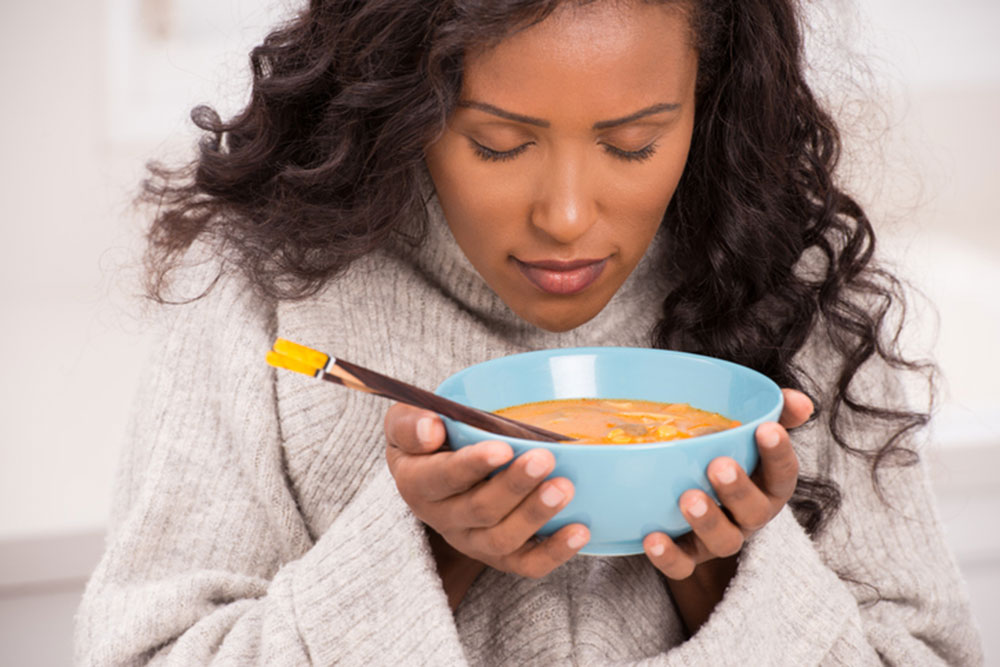
iStock
WHEN FEELING fearful, try blueberry crisp, suggests Washington Post food videos editor Mary Beth Albright, who gives comfort diet advice for four “fundamental human emotions”: afraid, sad, glad and mad.
But former FDA chairman David Kessler, who warns above all against eating starch, notes: “When I get stressed, I fall off the wagon.” While previously sugar, fat and salt have been the villains, Kessler says, “the delivery device of harm” is starch.
“I primarily see the world through a food lens,” writes Albright; while David Kessler considers starch his “different lens.”
From the Harvard Health letter advice on comfort eating, the main suggestion is to figure out why you need it —does it calm you down, cheer you up, compensate for a tough day—and what are your triggers. In these days of the pandemic, though, the why and the triggers are both less of a mystery but also harder to counter.
Kindness can override diet, according to the “rabbit effect”—the name given research on rabbits fed very high-fat diets that found only those cuddled and read to while eating escaped the host of heart problems suffered by the rest, according to Judith Newman.
Finally, comfort in times of sickness may come from foods like garlic and turmeric—in the belief that they boost immunity. The link between these foods and immunity could help explain why some countries, including India, Japan, Lebanon and Thailand, have much lower rates of coronavirus infection than would be expected based on variables like overcrowding, an aging population or more travelers to and from China.
Albright chose comfort foods based on the microbiome-body connection, which affects both immunity and mental health. Probiotics (food containing bacteria such as yogurt and kimchi) help to maintain healthy levels of good bacteria to support immune defenses, according to University of Newcastle molecular nutritionist Emma Beckett.
And “prebiotic” food (including legumes, oats and beans), which remain largely unaltered during digestion, feed the healthy bacteria. The gut and the brain communicate about mood, state of mind and stress level, according to NYU clinical medicine professor Lisa Ganjhu, who refers to the brain as part of the gastrointestinal system.
In people suffering from depression, several species of gut bacteria are missing, according to a European study. But whether the absence is a cause or effect of the illness is unclear. Because gut microbes have an average lifespan of about 20 minutes, one meal can quickly alter the entire population of an individual’s microbiome.
About blueberry crisp, writes Albright: “it’s weirdly satisfying to put your fingers right in the topping,” and makes your home “a place that smells like good things are happening.” After choosing the four human emotions, though acknowledging there is some disagreement about these, she usually starts with her “dominant one.”
For sad, she recommends “pureed (insert any vegetable) soup”; for glad, hummus is “eminently shareable” and chickpeas are rich in choline “that supports your brain and moods.” For mad, she chooses smashed cucumber salad—whole cucumbers in a Ziploc bag smashed with rolling pin until flat – or “almost any activity that safely engages angry energy.”
Four emotions also form the core of emotional eating—fear, anger, tension and shame (FATS), with fear being the root emotion, according to psychotherapist Doreen Virtue, author of Constant Craving: A-Z (Hay House, 1999). Cravings for food stem intuitively from emotional or physical imbalance, writes Virtue; and are a sign that the body and the emotions are in need of peace or homeostasis.
Rolled oats, one of the blueberry crisp ingredients, is on David Kessler’s list of good foods – along with legumes like chickpeas, quinoa and brown rice—to choose instead of starch (which includes ground and instant oats). Starch, as described by the Washington Post, is the “white, powdery tasteless substance found in processed foods that results when food manufacturers mill, puff, pop and otherwise refine wheat and corn, stripping out its natural structure, which makes it rapidly absorbable by the body.”
“Fast carbs,” as Kessler calls them in his book, Fast Carbs, Slow Carbs, are both irresistible and absorbed so quickly that we don’t feel full—and thus remain hungry for more. Eating fast carbs can cause insulin resistance, which allows sugar to build up in the blood and can lead to metabolic syndrome and in turn to stroke and heart disease.
Medical schools now include courses on culinary medicine, “unconcerned with the hypothetical case, and instead concerned with the patient in immediate need, who asks, ‘What do I eat for my condition?’” writes Santa Barbara physician and nutrition expert John LaPuma, “As food is condition-specific, the same diet does not work for everyone.”
What can also be both comforting and immune-boosting is tea made with fresh turmeric and ginger—and anything containing the anti-oxidant resveratrol: red and white wine, grapes and berries, peanuts and pistachios, and dark chocolate, especially comforting in a warm cup of cocoa.
—Mary Carpenter
Every Tuesday, well-being editor Mary Carpenter delivers health news you can use.

Good article on the link between food and mental health along with physical health, which probably everyone knows about. Actual recommendations for what ails you also appreciated.